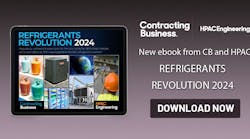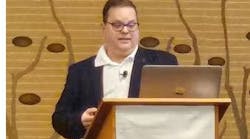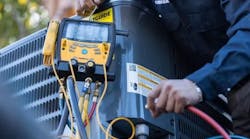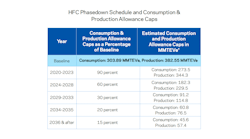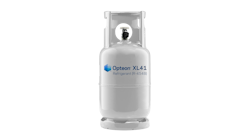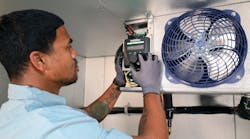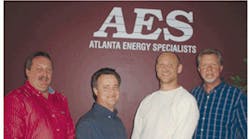Tom Alesi and Tim Moncrief have changed their philosophy of growing a business, from "gung-ho," to "go slow." They're growing Atlanta Energy Specialists carefully and methodically, with an emphasis on quality refrigeration service and installation, rather than quantity of customers.
Alesi has been a refrigeration professional since 1981, the year he graduated from DeKalb Technical College, Dekatur, GA, with a degree in HVAC technology. He had enrolled at DeKalb at the advice of his then brother-in-law, Barry Haddock, who was making much more money working for Big Star at the time doing refrigeration than Alesi was bringing in as a plumber.
After graduating, his first position was also with the Big Star supermarket chain. After many years there, he worked for three other large refrigeration companies, until he finally accepted a field supervisor position with Hussmann, servicing the Publix store account with his current business partner, Tim Moncrief. In 1997, a friend of Alesi's — Glen Rowe, who had founded AES as a residential HVAC business in 1991 — convinced Alesi to become a part-owner. One year later, health problems forced Rowe to sell his portion of the business to Moncrief. Alesi and Moncrief continued to provide residential HVAC services, and whatever else that would put money in the bank. They went to full-time refrigeration service after they had enough capital to finance new trucks and equipment and hire refrigeration technicians.
"We had one independent chain as a customer, with two stores. After we dramatically reduced their maintenance costs, they gave us all 11 of their stores," Alesi recalls. Refrigeration construction was added in 1999 after hiring Tim Spink, a long time friend which Alesi worked together with in the construction department for another company.
AES's reputation grew, and so did the demand for it's services. It won work with larger supermarket chains — including Kroger — and felt the pressure to hire more people to accommodate the new work.
"There was a lot of construction going on, and customers were asking us to take on more work. Our focus on quality started to slip, and our reputation started to drift," Alesi admits. By 2005, Alesi and Moncrief realized they had grown too fast too soon. Changes required scaling back about 20 to 25% of its workforce, and a new focus: quality over quantity.
"We're back in a growth mode, but we’re going to plan our growth more carefully," Alesi says. "We've made believers of the employees who remained with us, that quality was more important than the size of the company. We make sure we have the right people in place before we take on more customers."
Atlanta Energy Specialists' customers include supermarkets, convenience stores, liquor stores, and light industrial accounts. Equipment specialties include walk-in coolers, freezers, parallel rack systems, HVAC and warehouse refrigeration. AES currently employs 45 people; 37 are field technicians and field supervisors, ranging in age from 30 to 60.
Combined Experience Invaluable
AES's small but mighty management team has a more than 150 years of combined refrigeration experience. The team includes Alesi and Moncrief (each with 30 years of experience); Construction Manager Tim Spink (33 years); Service Manager Winky Ferguson (17 years); and Sales Manager, Jim Chester (44 years). For many years, Chester owned a leading local company, Jones Refrigeration.
"That longevity is priceless, when you consider the amount of knowledge he brings to the table when it comes to finding replacement equipment for outdated equipment. Jim still goes out on the road selling jobs in his suit and tie," Alesi says.
"Our experience, enables us to work on equipment from the 70s up to today’s systems," Alesi says.
Work on those golden-oldie systems will gradually fade, as newer systems replace the dinosaurs. AES is ready, and has experience in carbon dioxide (CO2) and glycol systems. It recently installed a Kysor/Warren CO2 system in a Food Lion supermarket in Columbus, GA (find the story at http://bit.ly/co2installation).
In-house training
Training is an essential ingredient in AES's recipe for success. Before Alesi even considers a candidate's refrigeration knowledge, the prospect must have good electrical skills. "If a person is hired, they have a minimum of 12 weeks of supervised field experience. After that if we're confident in their ability, we put them in the field alone. However, they're in constant communication with field supervisors."
Training sessions are held every second Wednesday, except during very busy summer months. "If we see a technician struggling in a certain area, we help them out; if we install a new glycol system, we'll take the techs out to the site and go over it. If we see they're lacking in any repair concept, we review it with them. We do whatever we have to do to make sure they have the knowledge," Alesi says. "We have ongoing training because the equipment is constantly changing. Well trained technicians are an essential element of customer service," Alesi says.
As you can see, going slower doesn't necessarily mean a company is dragging its feet. Alesi and Moncrief may have modified the pace at which AES grows, but they're thinking, and planning ahead, at breakneck speed.
Lennox Acquires Kysor/Warren
The Manitowoc Company has agreed to sell Kysor/Warren to Lennox International for approximately $138 million. The sale includes the Kysor/Warren refrigerated display merchandisers manufacturing business in Columbus, GA as well as Kysor/Warren de Mexico."Over the last several years, Manitowoc has built a strong portfolio of leading brands serving the commercial foodservice industry, and we believe the value of Kysor/Warren will be better leveraged under Lennox's ownership," says Glen E. Tellock, Manitowoc's chairman/CEO. "Refrigeration is a core business for us, with solid long-term performance," says Todd Bluedorn, CEO, Lennox International. He adds that the Kysor/Warren acquisition supports the Lennox growth strategy in the refrigeration market, and extends the value chain to food retail and supermarket customers. http://bit.ly/lennoxkysor
Service Tip:
Crankcase Pressure Regulating Valves
Q: What purpose do CPRs serve?
A: Crankcase pressure regulating valves (CPRs) regulate the downstream pressure to a maximum value. These are commonly installed in the suction line ahead of the compressor to limit the inlet pressure to the compressor. Limiting the inlet pressure prevents the compressor from "stalling" during start up if the compressor is overloaded. CPRs are also used in other applications such as two valve flooding systems to maintain a minimum head pressure. In this application, the CPR has a higher pressure range and is used to pressurize the receiver to maintain liquid pressure.
Q: How do I set the CPR?
A: To limit the pressure entering the compressor, obtain the compressor manufacturer's specification for the maximum allowable suction pressure for the refrigerant and temperature. Using a low pressure gage, set the valve several pounds lower than the maximum pressure. An alternate method is to use an ammeter while opening the valve to a set point which does not exceed the maximum amp rating for the compressor.
Q: How do I set the CPR for a flooding application?
A: The valve should be set to maintain the minimum liquid pressure to prevent "flash" gas in the liquid line and to maintain proper feeding of the expansion valves. This setting should be approximately 10 PSIG lower than the flooding hold-back valve.
Copyright 2008 Emerson Climate Technologies, Inc. All rights reserved. Used by permission.
